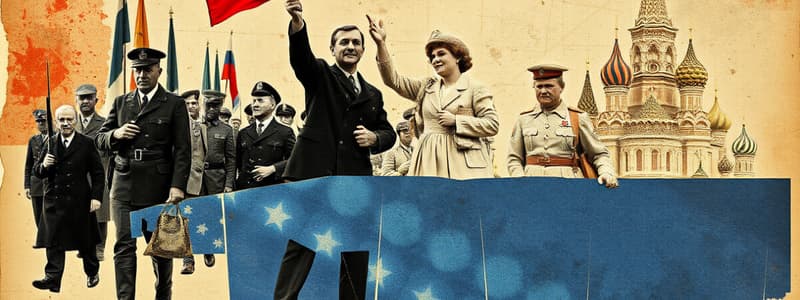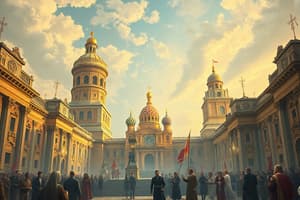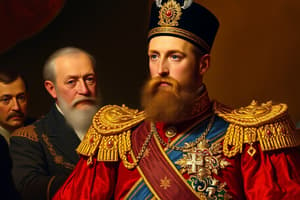Podcast
Questions and Answers
What was one of the key aims of the Bolsheviks regarding the Provisional Government?
What was one of the key aims of the Bolsheviks regarding the Provisional Government?
- To assume power and overthrow the Provisional Government (correct)
- To maintain the existing political structure
- To collaborate with the Provisional Government
- To establish a monarchy in Russia
How did the return of Lenin in April affect the Bolsheviks' strategy?
How did the return of Lenin in April affect the Bolsheviks' strategy?
- It aligned their actions with the aim of overthrowing the government (correct)
- It caused internal conflicts within the group
- It led to their withdrawal from political activities
- It resulted in their immediate election victories
What was the initial position of the Bolsheviks towards the Provisional Government before Lenin's return?
What was the initial position of the Bolsheviks towards the Provisional Government before Lenin's return?
- They believed in complete military takeover
- They sought to disband the government immediately
- They aimed to work within the Dual Authority (correct)
- They were entirely supportive of the government
In what context should the effectiveness of opposition to the Provisional Government be judged?
In what context should the effectiveness of opposition to the Provisional Government be judged?
What was a common misconception about the fate of the Provisional Government?
What was a common misconception about the fate of the Provisional Government?
Which of the following groups did not necessarily aim to overthrow the Provisional Government?
Which of the following groups did not necessarily aim to overthrow the Provisional Government?
What can be said about the impact of the Bolsheviks before the July Days?
What can be said about the impact of the Bolsheviks before the July Days?
Which of the following statements is true regarding the opposition to the Provisional Government?
Which of the following statements is true regarding the opposition to the Provisional Government?
What was the main aim of the central Rada formed in Kiev, Ukraine?
What was the main aim of the central Rada formed in Kiev, Ukraine?
Which body was formed in response to demands for self-rule in the Transcaucasus?
Which body was formed in response to demands for self-rule in the Transcaucasus?
What was one of the significant issues the Provisional Government faced?
What was one of the significant issues the Provisional Government faced?
How did the actions of the Rada and Sejm impact local governance?
How did the actions of the Rada and Sejm impact local governance?
What was a key factor that contributed to the Provisional Government's downfall?
What was a key factor that contributed to the Provisional Government's downfall?
Which group was instrumental in the overthrow of the Provisional Government?
Which group was instrumental in the overthrow of the Provisional Government?
What misconception did the Provisional Government have regarding regional opposition?
What misconception did the Provisional Government have regarding regional opposition?
What socio-economic problem was most pressing among the peasant population of Georgia, Estonia, and Ukraine?
What socio-economic problem was most pressing among the peasant population of Georgia, Estonia, and Ukraine?
Which of the following was NOT a contributing factor to the Provisional Government's challenges?
Which of the following was NOT a contributing factor to the Provisional Government's challenges?
What role did the circumstances of war play in the effectiveness of the Provisional Government?
What role did the circumstances of war play in the effectiveness of the Provisional Government?
What was one of the primary rights granted to workers by the Provisional Government?
What was one of the primary rights granted to workers by the Provisional Government?
How did the Provisional Government's approach to the war affect its relationship with workers?
How did the Provisional Government's approach to the war affect its relationship with workers?
What was a significant factor that weakened the Provisional Government's authority?
What was a significant factor that weakened the Provisional Government's authority?
What role did the army play during the July Days?
What role did the army play during the July Days?
What was the main focus of the Bolsheviks' campaigns that resonated with both the workers and peasants?
What was the main focus of the Bolsheviks' campaigns that resonated with both the workers and peasants?
What outcome resulted from the Kornilov Revolt?
What outcome resulted from the Kornilov Revolt?
How did national minorities react to the Provisional Government's inaction?
How did national minorities react to the Provisional Government's inaction?
What essential change did the Provisional Government fail to implement that contributed to their downfall?
What essential change did the Provisional Government fail to implement that contributed to their downfall?
What was the impact of widespread inflation on workers during the Provisional Government's time?
What was the impact of widespread inflation on workers during the Provisional Government's time?
What did the influence of the Petrograd Soviet over workers represent?
What did the influence of the Petrograd Soviet over workers represent?
What characterized the relationship between the Provisional Government and the peasants during this period?
What characterized the relationship between the Provisional Government and the peasants during this period?
Why did the Provisional Government initially maintain some level of order within the army?
Why did the Provisional Government initially maintain some level of order within the army?
What was a consequence of the continued war on the urban social fabric?
What was a consequence of the continued war on the urban social fabric?
What was the primary role of the Petrograd Soviet when it was first created?
What was the primary role of the Petrograd Soviet when it was first created?
Which event is considered a turning point for the Bolsheviks following the July Days?
Which event is considered a turning point for the Bolsheviks following the July Days?
What was the effect of Soviet Order Number One on the Provisional Government?
What was the effect of Soviet Order Number One on the Provisional Government?
What happened to Trotsky during the July Days?
What happened to Trotsky during the July Days?
How did the Bolsheviks' perception change after the Kornilov Affair?
How did the Bolsheviks' perception change after the Kornilov Affair?
What was one significant reason for the failure of the June Offensive?
What was one significant reason for the failure of the June Offensive?
How did the Bolsheviks use the slogan 'All Power to the Soviets' effectively?
How did the Bolsheviks use the slogan 'All Power to the Soviets' effectively?
What was a consequence of the Bolsheviks' rise in elections beginning in September?
What was a consequence of the Bolsheviks' rise in elections beginning in September?
What role did Trotsky play in the Bolsheviks' rise to power after the Kornilov Affair?
What role did Trotsky play in the Bolsheviks' rise to power after the Kornilov Affair?
What was a major reason for questioning the effectiveness of the Petrograd Soviet?
What was a major reason for questioning the effectiveness of the Petrograd Soviet?
What did the Bolsheviks ultimately achieve at the Congress of the Soviets?
What did the Bolsheviks ultimately achieve at the Congress of the Soviets?
What characterized the opposition to the Bolsheviks before and after August?
What characterized the opposition to the Bolsheviks before and after August?
Who was seen as a potential instigator of the Kornilov Affair?
Who was seen as a potential instigator of the Kornilov Affair?
Flashcards are hidden until you start studying
Study Notes
Effectiveness of Opposition to the Provisional Government
- The Provisional Government was overthrown by an opposition group, indicating some level of effectiveness despite a simplistic view of opposition as solely responsible for its downfall.
- Opposition categories influencing the Provisional Government’s stability: Bolsheviks, Petrograd Soviet, workers, peasants, army, and national minorities.
Bolsheviks
- Aimed to overthrow the Provisional Government and assume power, though their strategy initially involved collaboration within the Dual Authority.
- Lenin's return in April 1917 marked a shift towards more direct opposition against the Provisional Government.
- Limited impact before the July Days, where Bolshevik actions were not yet dominant; after July, perceived as ineffective due to arrests and suppression.
- Kornilov Affair provided an opportunity; Bolsheviks defended Petrograd and gained popularity as defenders of the revolution.
- From September onwards, their influence surged, aided by Trotsky's leadership and military strategies, culminating in the October Revolution.
Petrograd Soviet
- Initially served as a collaborative body with the Provisional Government, aiding governance and maintaining order during early months.
- Soviet Order Number One diminished the Provisional Government's authority, contributing to chaos during the June Offensive and Kornilov Revolt.
- Served as a platform for Bolshevik propaganda like "All Power to the Soviets," masking their control.
- Effectiveness is contested; despite collaboration, key actions like Soviet Order Number One were crucial in undermining Provisional authority leading to Bolshevik power.
Workers
- Workers played a vital role in overthrowing Nicholas II and initiating the Provisional Government through strikes.
- Provisional Government promised reforms, such as freedom of speech, assembly rights, and recognition of trade unions, but failed to address core social and economic issues.
- Increasing unrest due to continued war exacerbated living conditions; workers increasingly supported Soviet factions over the Provisional Government.
- The July Days illustrated workers' opposition but ultimately failed due to lack of organization and cohesive planning.
Peasants
- Long-standing land issues fueled peasant unrest even before 1917, leading to widespread land seizures amidst the war and government instability.
- The Bolsheviks capitalized on peasant dissent with slogans like "Peace, Bread, and Land," which reflected their grievances.
- Peasant actions significantly eroded the Provisional Government’s authority, creating challenges for controlling rural areas.
Army
- Initial support for the Provisional Government from the army; July Days and Kornilov Revolt did not see substantial opposition from military forces.
- The army's reliability waned later on, particularly with desertions linked to peasant land concerns.
- Contributed to the Provisional Government's end, especially through the actions of soldiers aligned with the Bolsheviks during crucial moments like the October Revolution.
National Minorities
- Often overlooked, national minorities expressed significant discontent with the Provisional Government's inaction regarding autonomy and regional rights.
- Responses to their demands formed local governments and movements, indicating widespread dissatisfaction and stimulating further disintegration of central authority.
- The inability to effectively address minority demands contributed to the weakening of the Provisional Government and facilitated the rise of local leftist parties.
Conclusion on the Effectiveness of Opposition
- The Provisional Government’s downfall linked to a combination of direct opposition actions, circumstances, and its own decisions.
- Key factors leading to the collapse included the unified actions of the Bolsheviks and the Petrograd Soviet amidst pressing social issues, unrest from workers and peasants, and the military's eventual loss of support.
- Broad discontent and historical grievances left the Provisional Government with little support by October 1917, leading to its fall.
Studying That Suits You
Use AI to generate personalized quizzes and flashcards to suit your learning preferences.





